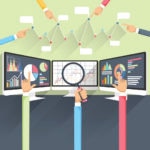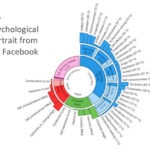Understanding social networks and studying how they form and operate can help us understand all kinds of other events, including economic phenomena like bank runs and market crashes, through to warfare and crime.

“The perfect solution is to serve each consumer individually; the problem is there are 7 billion consumers”. All these people leave their imprint on social networks, and it is even possible to outline their psychological profile and predict their behavior, as shown in this study by IBM, which reveals that a person's personality can be defined by analyzing their tweets and Facebook messages .
Depending on the number of messages posted on the Facebook wall –for example–, you can tell whether a person is going to stop being and get married. It also reveals a person's character traits –hedonistic, altruistic, depressive, and so on– and this information can be used by companies' Human Resource department in their selection process.

In the most recent American election, President Barack Obama varied his discourse based on what the citizens were posting on social networks in the places where he was due to give campaign speeches on the issues that concerned them. it is now possible to predict the box office talkings of a film thanks to the expectation generated before its release on Twitter and Facebook, or estimate the purchasing volume of certain supermarket products by studying the comments...
At the start of they year, the Bank of England announced the creation of a special team of analyst to study people's behavior on the social networks in order to predict the economy. I the United States, high-risk funds like Tashtego have begun to study the use of Twitter and Facebook by inverstors, and hedge funds as a guide to investing in particular stocks and bonds.
All the traces left on Twitter, Facebook or the applications installed on your computer are stored and analyzed, and your searches and purchases are subjected to the closest scrutiny. "The variable of the social networks complements the traditional model. In the case of predicting stock prices it is very risky to use the variable and only to take into account what people say on social networks, but it services as a complement".
Information transformed into value
Professor Juan José Casado, academic director of the Master of Business Analytics at the IE Business School, points out that although banking is not the best example for demonstrating the predictive power of social networks, many purchasing behaviors can be predicted thanks to social networks. “These give us a lot of information: information on feelings –whether I like something or not–, intention to buy –comments–, or volume –number of product mentions”, explains Casado.
The professor gives leisure as an example for explaining the success of the predictions. “Models are being developed for film or television that can predict the first week's box office takings to 90% thanks to the noise generated before the launch”. The study entitled Predicting the Future with Social Media shows the relation between the interest registered on a film on Twitter and box office revenues. The Walmart chain is able to increase its predictions by 24% by analyzing social networks, compared to what they could have done studying only traditional methods. It allows the company to calculate the purchasing and returns volume and save amounts of up two figures.
“Major corporations and banks are looking more closely at their customers to detect interests and consumption habits. Organizations can learn more about their customers and offer them what they like by studying their behavior on the social networks. They create a list of customers' interests in order to offer them products”, says Casado, who points out that there needs to be “absolute transparency” to ensure people do not reject this model.
“People surrender their privacy in exchange for obtaining some value and for customization. Advertising should be a value and not a hindrance”. The challenge for companies is to succeed in learning the needs of the whole population, but treating it in a personalized way. For the expert Nicholas Christakis, author of The hidden influence of social networks, “understanding social networks and how they form and operate can help us understand all kinds of other phenomena –like crime, and warfare, and economic phenomena like bank runs and market crashes”.